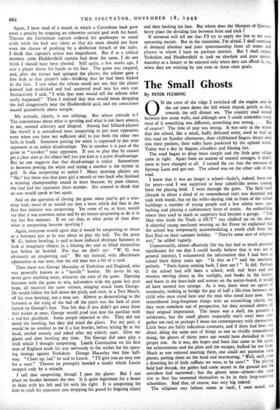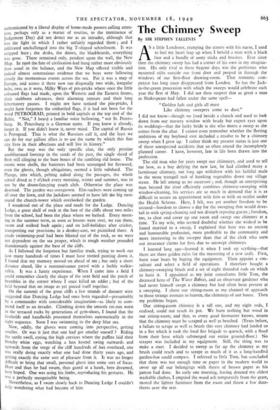The Small Ghosts
By PETER FLEMING
ON the crest of the ridge I switched off the engine and let the car coast down the hill which sloped, gently at first, towards the still distant sea. The country road wound between low stone walls, and although now I could remember every twist of it something was different, something was wrong. .. . But of course! The time of year was wrong. It was only in the winter that the school, like a small, badly defeated army, used to trail up this road on Sunday afternoons, their chilblained fingers thrust deep into their pockets, their sulky faces puckered by the upland winds. Today was a day in August, cloudless and blazing hot.
The road began to drop more steeply and the little grey village came in sight. Apart from an annexe of council cottages, it didn't seem to have changed at all. I turned the car into the entrance of Spyway Lane and got out. The school was on the other side of the road.
I knew that it was no longer a school—hadn't, indeed, been one for years—and I was surprised to hear school-like noises coming from the playing field. I went through the gates. The field itself (shrunk to about a third of its remembered size) was deserted and rank with weeds, but on the roller-skating rink in front of the school buildings a number of young people and a few adults were sun- bathing and playing a rudimentary form of tennis. An outbuilding where they used to teach us carpentry had become a garage. "The Man who lends the Tools is OUT" was chalked up on the door. A cheerful young mechanic wearing an Air Force tie explained that the school was temporarily accommodating a youth club from the East End on their summer holiday. " They're some sort of religious sect," he added vaguely.
Unnecessarily, almost effusively (for the fact had so much personal significance for me that I could hardly believe that it was not of general interest), I volunteered the information that I had been at school there thirty years ago. " Is that so ? " said the mechanic politely. " Feels funny coming back, I dare say 1 " It did. Perhaps if the school had still been a school, with real boys and real masters moving about in the sunlight, and books in the lockers and boots in the boot-hole and notices on the notice-board, it would all have seemed less strange. As it was, there were no agents of continuity, nothing to bridge the gap of half a life-time between the child who once stood here and the man who stood here now. One remembered long-forgotten things with an astonishing clarity, but they were somehow out of perspective, for they retained almost all their original importance. The house was a shell, the grounds a wilderness, but the small ghosts (especially one's own) were alto- gether too real, or perhaps I mean too contemporary with themselves. Little boys are fairly ridiculous creatures, and if there had been anY about, doing the same sort of things as one so vividly remembered doing, the ghosts of thirty years ago would have dwindled to their proper size. As it was, the hopes and fears that came to life again, the achievements and the plots and the escapes, bulked far too large. Much as one enjoyed meeting them, one could not patronise these ghosts, patting them on the head and murmuring, " Well, well, what a diverting lot of little ruffians we were, to be sure! " The playing field had shrunk, the gables had come nearer to the ground and the corridors had narrowed ; but the ghosts were—almost—the same size as they has esteemed themselves to be in their long-vanished schooldays. And that, of course, was very big indeed.
The religious sect (whose status as such, I soon noted, was
authenticated by a liberal display of home-made posters calling atten- tion, perhaps only as a matter of routine, to the imminence of Judgement Day) did not detect me as an intruder, although that was the light in which I rather unfairly regarded them ; and I infiltrated unchallenged into the big T-shaped schoolroom. It was stripped bare ; the desks, the daises, the blackboards, everything was gone. There remained only, pendant upon the wall, the New Map. In 1916 the fate of civilisation had hung rather more obviously than usual in the balance, and the New Map offered visible and indeed almost ostentatious evidence that we boys were following closely the momentous events across the sea. For it was a map of Europe, and across it there now ran diagonally two wide, irregular belts, two, as it were, Milky Ways of pin-pricks where once the little coloured flags had made, upon the Western and the Eastern fronts, their stubborn advances, their alarming retreats and their long hibernatory pauses. I might not have noticed the pin-pricks, I might have forgotten the embattled flags, if it had not been for the word PETROGRAD, printed in bold capitals at the top end of the Baltic. "Not," I heard a familiar voice bellowing, " not St. Peters- burg. St.. Petersburg is a German name. If you knew it already, forget it. If you didn't know it, never mind. The capital of Russia is Petrograd. That is what the Russians call it, and the least we can do for our gallant allies is to use the name by which this fine city lives in their affections and will live in history."
But the map was the only specific clue, the only pristine unobliterated footstep in the sands of the past, the single shred of flesh still clinging to the bare bones of the rambling old house. The rooms were shells, the banisters had been scrounged for firewood, even the ghosts, though ubiquitous, seemed a little subdued. The Plunge, into which, pelting naked along the passages, the whole school dived at 7 o'clock every morning, winter and summer, was in use by the doom-fancying youth club. Otherwise the place was deserted. The garden was overgrown. Elm-suckers were coming up all over the lawn, and the jackdaws seemed to have left the big trees round the church-tower which overlooked the garden.
I wandered out of the place and made for the Ledge. Dancing Ledge, a great shelf of rock at the foot of the cliffs about two miles from the school, had been the place where we bathed. Every morn- ing in the summer term, as soon as lessons were over, we ran there, swam and walked back again ; and on half-holidays after cricket, transporting our provisions in a donkey-cart, we picnicked there. A crude swimming-pool had been blasted out of the rock, so we were not dependent on the sea proper, which in rough weather pounded thunderously against the base of the cliffs.
As I followed the forgotten but familiar track, trying to work out how many hundreds of times I must have trotted panting down it, I found that my memory moved on ahead of me ; but only a short distance ahead, like a reconnaissance patrol with a feeble walkie- talkie. It was a funny experience. When I came into a field I could remember clearly the shape of the next field and the patch of brambles in the corner where I once killed an adder ; but of the field beyond that no image as yet pieced itself together.
On the summit of the great cliffs a few strands of dannert wire suggested that Dancing Ledge had once been regarded—presumably by a commander with considerable imagination—as likely to com- mend itself to an invader. Climbing down the smooth rat-run worn in the terraced rocks by generations of gym-shoes, I found that the footholds and handholds presented themselves automatically in the right sequence. Soon I was swimming in the deep blue sea.
Now, oddly, the ghosts were coming into perspective, getting smaller. Or was it just that one had got smaller oneself ? Riding the sunlit swell, eyeing the high crevices where the puffins laid their blotchy white eggs, watching a hen kestrel swing outwards and upwards from the verge of the cliff hundreds of feet overhead, one was really doing exactly what one had done thirty years ago, and getting exactly the same sort of pleasure from it. It was no longer difficult to bring that small, personal ghost into some sort of focus. Here and thus he had swum, thus gazed at a hawk, here dreamed, here hoped. One was using his limbs, reproducing his gestures. He was a perfectly recognisable being.
Nevertheless, as I swam slowly back to Dancing Ledge I couldn't help wondering what had become of him.















































































 Previous page
Previous page